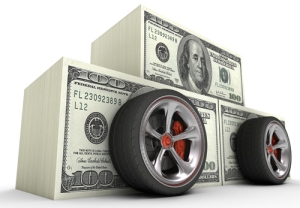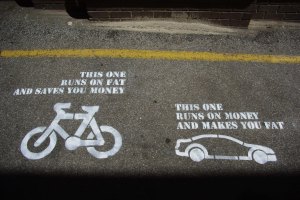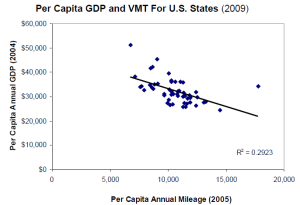My family eagerly decided to forgo a second car four years ago when we moved to Dunedin, New Zealand; a decision we have never regretted. It turns out by doing so, we are not just happier, healthier, and polluting less, but we are also considerably wealthier while helping our local economy through the “multiplier effect“. Let me explain.
 What does it cost to own a car? It’s not just what you pay for the car, but the total monetary outlay. Those costs can vary quite a bit for different people depending on where you live, how you drive, how fast you drive, what you drive, how far you drive (Kiwi’s drive on average 14,000km per year according to the AA), interest and insurance rates, depreciation, maintenance, unexpected repairs and other factors. Let’s keep it simple. According to the AA, for Kiwi’s the average car costs ranged from about NZ$7,400 to NZ$15,000 per year in 2012. So let’s assume one spends on average, something in the middle, say around NZ$11,000 per year.
What does it cost to own a car? It’s not just what you pay for the car, but the total monetary outlay. Those costs can vary quite a bit for different people depending on where you live, how you drive, how fast you drive, what you drive, how far you drive (Kiwi’s drive on average 14,000km per year according to the AA), interest and insurance rates, depreciation, maintenance, unexpected repairs and other factors. Let’s keep it simple. According to the AA, for Kiwi’s the average car costs ranged from about NZ$7,400 to NZ$15,000 per year in 2012. So let’s assume one spends on average, something in the middle, say around NZ$11,000 per year.
That’s approximately my annual personal one-less-car dividend from not being a two-car family. Of course it’s offset by extra expenses for bikes and transit use, but these amount to less than about NZ$1,000 per year. So I am still NZ$10,000 ahead. That’s a tax-free (I already paid taxes on the income) NZ$770 per month. I won’t get into land use details right now, but having one car also means I don’t need two garages and thus my house payment is smaller (or I have more storage) as well as my impact on the neighbourhood and city services for all that free parking. Did you know kerb parking space, most of which pays no rates, typically takes up ~5% of the urban environment (Shoup); a gift from the City to car users.
Now back to the multiplier effect. About 3/4 of the money you and I spend on petrol and 86% of the money we spend on car purchases immediately leaves the Dunedin economy (see NY City Green Dividend). Why is that? Because we don’t make cars and we don’t own oil wells and refineries here. It’s a similar story for insurance, often owned here by offshore companies and shareholders from who knows where. Put simply, when you spend less on cars, you have more left over to spend locally.
 When you spend more locally the multiplier effect works like this (in principle, don’t hang onto the actual dollar amounts, it’s an economics lesson, not a precise calculation). Say I have $10 in my pocket. I go to my favorite coffee shop and get something for me and a friend. That $10 pays for a staff member to head over after work to a brewery. The night shift worker there takes the $10 to the Farmer’s Market the next day to buy a couple of bacon butties and so it goes. The 10 dollars has turned into 30 dollars in GDP with each transaction and portions continue to be recycled through our local economy. If the 10 dollars was spent on petrol, most of it left Dunedin right away and could not multiply.
When you spend more locally the multiplier effect works like this (in principle, don’t hang onto the actual dollar amounts, it’s an economics lesson, not a precise calculation). Say I have $10 in my pocket. I go to my favorite coffee shop and get something for me and a friend. That $10 pays for a staff member to head over after work to a brewery. The night shift worker there takes the $10 to the Farmer’s Market the next day to buy a couple of bacon butties and so it goes. The 10 dollars has turned into 30 dollars in GDP with each transaction and portions continue to be recycled through our local economy. If the 10 dollars was spent on petrol, most of it left Dunedin right away and could not multiply.
Caveats: ‘Your mileage may vary’, as they say. First, you may decide to use the all the savings for a trip to Fiji; great for Air New Zealand and the Fijian economy, not so good for Dunedin. Secondly, if you happen to own a car dealership or petrol station, declining car ownership trends won’t help your business unless you start selling electric bikes as well. There are always winners and losers as people make choices what they desire, what to invest in, and where to spend their dollars. But less income for car-related businesses means more opportunities for bike-related and other businesses. Times change and smart business men and women change with their customers. No one is lamenting the loss of horse and buggy sales are they?
The key takeaway is that when more money stays longer in the local economy more local people gain. It makes the local economy more productive and resilient. With the challenges regional centers like Dunedin faces competing economically and politically with the big urban centers, it is good business to counter the threats and replace them with opportunity and efficiency. Excessive car ownership can actually weaken the local economy (and I haven’t even brought in the substantial health care and social costs from injury and inactivity).
Does this actually work in the real world? Look here at a graph of the per capita GDP for different states in the US, by the per capita annual mileage driven (from Todd Litman*).
 Per capita economic productivity increases as per capita vehicle travel declines (each dot is a U.S. state.). This is not a one-to-one causal relationship, but it is consistent with the notion that reduced car use can contribute to overall economic strength.
Per capita economic productivity increases as per capita vehicle travel declines (each dot is a U.S. state.). This is not a one-to-one causal relationship, but it is consistent with the notion that reduced car use can contribute to overall economic strength.
Some back-of-the-envelope calculations suggest that if each Dunedin household with two or more cars would drop one (there are 45,000 occupied dwellings according to the 2006 Stats NZ Census and about 47% of them have two or more vehicles) there would be 21,000 fewer cars in the City at a cost savings of ~$10,000 / car = about $200 million (rounded) per year. If say, on average, 75% of that cost leaves the local economy, we lose about $150 million per year. To put this into some perspective, $150 million is pretty close to 70% of the total annual operating costs for the City.
The local multiplier effect says we can be better off in many ways
by choosing one less car.


Comments